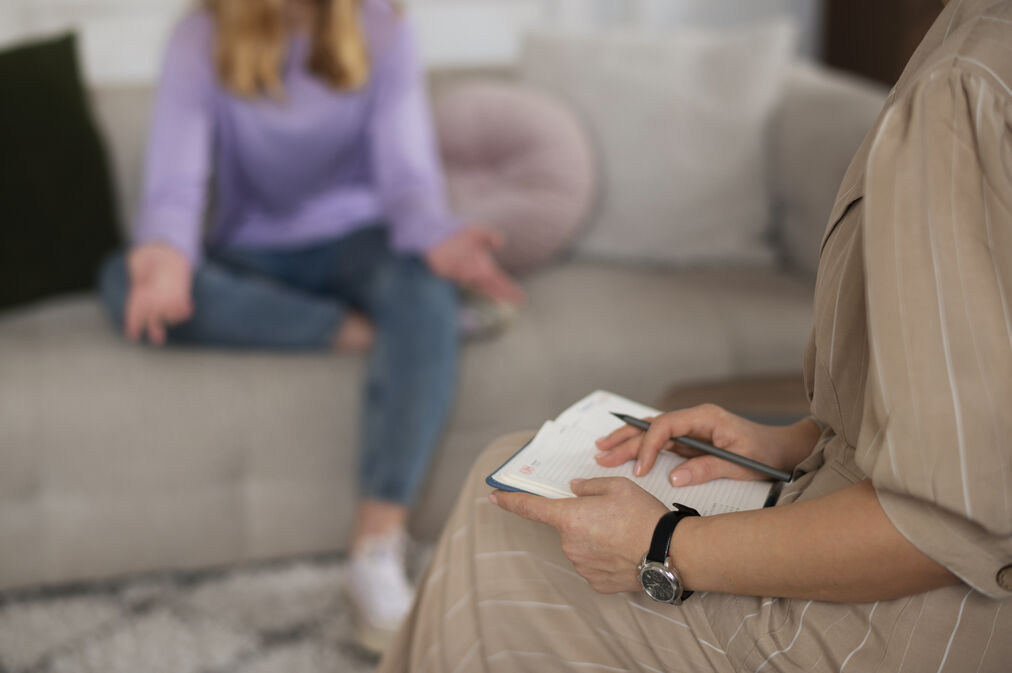
If you’ve ever thought about having counselling sessions but weren’t sure what to expect, you’re not alone. Many students have questions before they take that first step, and it’s completely normal to want some clarity.
While counsellors and clinical psychologists have individual styles and approaches, there are certain things that tend to be common across the process. This article answers some of the questions we hear most often from students, giving you a clearer sense of what counselling involves, what it can help with, and how you can make the most of it.
What happens in counselling?
Counselling is a focused conversation with a trained professional, shaped around your particular needs. Depending on your situation and your therapist’s style, you might set specific goals and agree on how to work towards them, or you might take a more open-ended approach. Some clients want to explore themselves more deeply, untangle complicated thoughts or feelings, or make sense of a difficult experience, while others seek support to get through a particular situation or event. Even without a concrete goal, the work should still be moving you towards greater clarity, understanding, or stability.
What happens in a session?
In your first session, your counsellor or clinical psychologist will usually explain what to expect from the process – how long each session lasts, how often you’ll meet, and a few key policies. Even if you’ve already signed an informed consent form, important points such as confidentiality and its limits should be explained verbally so you’re clear about your rights and the boundaries of the therapy relationship. The early part of counselling is often about getting used to each other, understanding your concerns, and deciding together on a way forward that feels right for you.
How many sessions do I need?
There’s no fixed number – it depends on your situation and what you want to work on. Some students find that a few sessions are enough to address a specific issue or develop strategies for coping. Others may benefit from longer-term work, especially if the concern is deep-rooted or affects many areas of their life. The important thing is to review progress with your therapist regularly so you can agree together on whether to continue, pause, or end. Counselling isn't about staying in therapy forever, but getting the support you need for as long as it’s useful.
How does counselling work?
At its core, counselling helps you explore your thoughts, emotions, and behaviours in a focused way, with the guidance of a trained professional. The relationship between you and your therapist is central. Through this relationship, you gain a clearer understanding of yourself, learn strategies for handling difficulties, and find new ways to respond to life’s challenges. Counsellors might use different approaches – like cognitive behavioural techniques, mindfulness, or exploratory conversation – but they all aim to help you make changes that feel meaningful and sustainable.
How do I know if counselling is working for me?
Progress can look different for everyone. Sometimes it’s a clear change – you feel less anxious, more confident, or better able to manage stress. Other times, it might be more subtle, like noticing new insights, finding it easier to express feelings, or responding differently to challenges. In the beginning, you might feel more discomfort before things improve, because you’re facing issues you’ve avoided. It’s worth talking openly with your therapist about how you’re feeling and whether the work is helping. Therapy works best when it’s a collaboration, and your feedback is part of that process.
Is counselling confidential?
Yes. However, there are a few exceptions which are made clear before you begin therapy. What you share in counselling is kept private between you and your therapist. This is a core part of building trust and helping you feel able to speak openly. Information you share isn’t shared with anyone without your consent (except in rare emergency or crisis situations). Records of your sessions are also stored securely, and only necessary information is shared when needed.
Are there any exceptions to confidentiality?
There are situations where counsellors and clinical psychologists are legally or ethically required to break confidentiality. These usually involve serious risk such as if you are in immediate danger of harming yourself, if someone else is at risk of harm, or if there is information about abuse of a child or vulnerable person. Your therapist should explain these limits in the first session, so you know exactly where you stand. Whenever confidentiality needs to be broken, your therapist will discuss this with you.
What's the difference between seeing a counsellor and talking to a friend?
Friends can offer empathy and support, but counselling is different in important ways. A counsellor is trained to listen without judgement, to help you explore patterns in your thoughts and behaviour, and to guide you in developing coping strategies. The focus is entirely on you, without the expectations or personal involvement that can come with friendships. Counsellors and clinical psychologists also work within ethical guidelines to ensure your privacy and wellbeing, and they have knowledge and resources that friends typically don’t.
I feel unsure whether my therapist is right for me – is that normal?
It’s not unusual to feel uncertain at first. It can take time to build trust, especially if you’ve never been in therapy before. Sometimes, discomfort comes from discussing difficult topics, which is part of the work. But if you feel judged, misunderstood, or simply don’t “click” after a few sessions, it’s OK to talk about it with your therapist. If it still doesn’t feel right, you can request to see someone else. The fit between client and therapist matters, and it’s important that you feel supported.
What's my role as a client in therapy?
Your role is to be as open and engaged as you can. This means showing up to sessions, talking honestly about what’s on your mind, and practising any strategies or reflections between meetings. You don’t have to know exactly what to say or how to “do therapy” – your therapist will guide the process. It also helps to give feedback about what’s working and what isn’t, so the sessions stay relevant to your needs. Therapy is a joint effort, and your active participation makes a real difference.
My friends said counselling is a "safe space" – what does that mean?
A safe space means a place where you can speak openly without fear of being judged, criticised, or exposed. In counselling, this safety comes from confidentiality, respect, and a supportive therapeutic relationship. But it doesn’t mean you’ll always feel comfortable. Sometimes, exploring your concerns can be challenging or bring up strong emotions. Your therapist is also likely to gently challenge you when needed, as a way of helping you see blind spots, assumptions, or biases you might have (and we all have them). The goal is not to avoid discomfort, but to work through it with the help of a professional who can support you along the way.
To learn more about what to expect from therapy, check out our Mindful Minutes podcast episode with Mr. Magtum Aen, a senior clinical psychologist at Sunway University (click here).
Note on Terms
In this article, we use the words “counsellor,” “clinical psychologist,” and “therapist” in a general way, as they’re often used interchangeably in everyday conversation. While counsellor and clinical psychologist can overlap, they differ in training, qualifications, or scope of practice, and are both recognised professional titles. The word therapist refers generally to either role but is not a professional title. Here, the focus is on the counselling process itself, rather than the specific background of the professional, so the advice applies broadly regardless of the exact title your therapist holds.
Counsellors and Clinical Psychologists
A counsellor is someone trained to help clients manage personal, emotional, or psychological issues through supportive, goal-oriented conversations. Clinical psychologists are trained to also work with more complex or severe mental health issues and can carry out psychological assessments as part of their work. Both aim to support mental and emotional wellbeing, but their approaches, training, and areas of focus may differ depending on their professional background.
Whenever you need us, we're ready to help you. If you're a Sunway student and need urgent help you can contact our 24/7 hotline on 015-48770405 or you can WhatsApp us 24/7 on 011-3011-6505.




